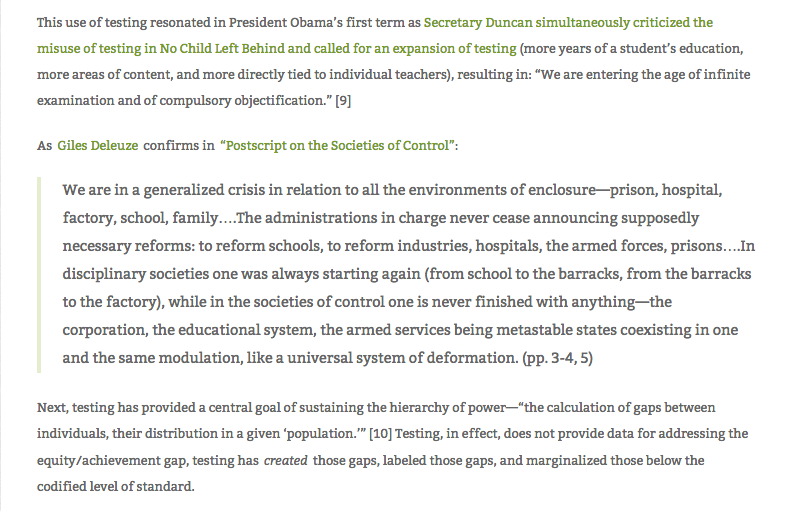Since the fall of 1984, I have been a teacher—the first 18 years as a high school English teacher in a rural public school in South Carolina, and then as a teacher educator at a private liberal arts university only about an hour’s drive from that high school and my hometown.
SC adds important layers to viewing the professions of K-12 teacher and college professor because SC is a so-called “right-to-work” state (non-union) and the South clings to a tradition of respecting authority (notably as a mask for lingering sexism, racism, and harsh attitudes about children).
Throughout my three-plus decades as an educator, I have worked within and against the accountability movement that has now reached a fever pitch, aiming the political, media, and public accusatory fingers at both teachers and teacher educators. I believe my public record as a strong public education, student, and teacher advocate is solid so it is incredibly difficult to turn my accusatory finger toward those colleagues I genuinely admire, have sought to defend against the misguided and dishonest attacks from the eduction reform movement.
As I have detailed repeatedly, claims that education is itself a powerful mechanism for social change and individual success and that teachers are the most important aspect of that formula are factually untrue.
Historically and currently, educators at all levels have little influence over or voice in public policy, and the norms of teaching have always dictated that teachers and professors remain objective, and thus not political, in the classroom.
All of these factors have combined for the perfect storm, specifically in the South but nationally as well, for further de-professionalizing teaching as federal and state policy continues to increase accountability based on prescriptive standards and high-stakes testing despite the growing evidence that those policies do not work.
Teacher education stands at the intersection of that disturbing trend.
“We have met the enemy and he is us.”
While I continue to seek ways to support K-12 teachers in raising and asserting their professional voices, I am deeply aware that public school teachers (especially in non-union states) must consider the job insecurity related to any political efforts.
Yes, I want K-12 public school teachers to embrace their empowerment, but I appreciate that call from a tenured university professor rings hollow.
That is not the case, however, among my university-based teacher educators, many of whom are themselves tenured and all of whom are directly culpable for the policies being imposed on both public education and teacher education.
Yet, in the same tradition of public school teachers, teacher educators remain mostly inert, passive, and compliant. In fact, as I have noted, many in teacher education rush to out-do the exact reformers poised to destroy public education and teacher education.
Education reform at all levels and in all contexts is designed so that everyone is constantly starting over, never able to finish because the bureaucracy needs that paralysis of infinite compliance:
Having now been in higher education for well over a decade, I have watched how other departments and disciplines function. Most disciplines are not only self-determining, but also self-policing.
Biologists are not scrambling to comply with political demands, and they certainly are not abdicating their field to political, media, or public expectations. Consider that biology remains firm on evolutionary biology and climate change despite the tremendous political, media, and public misunderstanding and misinformation about as well as resistant to significant bodies of research and credible evidence.
Teacher education, on the other hand, simultaneously notes that value-added methods (VAM) for evaluating teachers and teacher education are not supported by the research base while also rushing to implement policies that require VAM in teacher evaluation as well as certification and accreditation.
Such professional schizophrenia for K-12 teachers is unhealthy and dehumanizing, but often understandable in the larger context of job security.
In higher education, that professional schizophrenia is inexcusable.
To my fellow teacher educators, then, I must stress that we are the possible line in the sand about failed accountability, about the complete failure to implement evidence-based policy and practice.
When we lament the lack of respect for education by the other disciplines, when we lament that teaching is not a prestigious profession in the U.S., when we read yet another media trashing of teachers and teacher certification and degrees, when we listen to politicians and self-proclaimed reformers with no background in education make repeated claims that are untrue, how do we simply complain and then turn right around and comply?
Or possibly more important: Why do we simply complain and then turn right around and comply?
As long as we continue such schizophrenia, we are contributing to education as the punch line in a not-so-funny cartoon:
For Further Reading
Maxine Greene and the “Frozen Sea Inside of Us”
Lessons from the Zombie Apocalypse
“A generalized crisis in relation to all the environments of enclosure”: Deleuze
Re-framing teacher evaluation discourse in the media: an analysis and narrative-based proposal, Jasmine B. Ulmer




One thought on “The Fatal Flaw of Teacher Education: “We have met the enemy and he is us.””